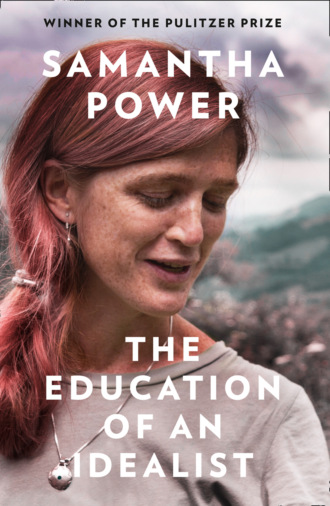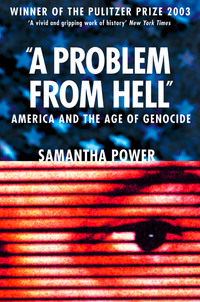
Полная версия
The Education of an Idealist
Schu and I then traveled north to Poland, which had experienced its first free election on the same day in June of 1989 as the Chinese crackdown in Tiananmen Square—a coincidence that would cause the landmark Polish vote to go almost unnoticed in the American media (a cold competition among world events that I would learn more about later on). Our most inspiring visit of the summer was to the Gdańsk Shipyard, where, in 1980, Lech Wałęsa had organized workers in a strike that would launch the Solidarity trade union. Solidarity turned into an opposition movement that eventually counted nearly a third of the country’s 35 million people among its members.
Yugoslavia, a country in southeastern Europe bordering the Adriatic Sea, was the one place that Schu and I did not warm to that summer. While we had been blessed to form new friendships in the other countries we visited, in Yugoslavia we struggled to make connections. The trains and buses were crowded and hot, and the Cyrillic alphabets in Serbia and Macedonia made finding our way more difficult. “It just seems there isn’t much laughter here,” I wrote in my journal.
Before we visited, Schu and I had thought of Yugoslavia as a single entity. But in Croatia, one of its six republics, the people we met expressed little allegiance to the confederation. Given that the country’s dictator, Josip Broz Tito, had died a decade before and that communism had now collapsed, it was not clear what or who would unite the country’s diverse inhabitants. “I wonder if the state will have a reason to exist,” I wrote to myself at the time. While fissures were evident even to an ill-informed tourist like me, I could never have imagined that the beach resorts where Schu and I swam would soon be subjected to intense bombardment by the Serb-led remnants of the Yugoslav Army. Indeed, the fall of the Iron Curtain had left us with the impression that the world was on its way to becoming more democratic, humane, and peaceful.
THE TRIP SCHU AND I TOOK to Europe cemented our relationship. But the closer we became, the more I worried about him. In the eight years since my father’s death, I had been trailed by a morbid fear that my loved ones would suddenly die. If Schu was even an hour late returning to our dorm, I was often in a full state of panic by the time he arrived.
I also began to suffer bouts of what Schu called “lungers.” Whether on campus or on our travels, every few weeks I would find myself struggling to breathe properly. I could identify nothing tangibly wrong, and I never rasped for breath or experienced asthma-like physical symptoms. I just felt, moment to moment, as though my lungs had constricted and I simply could not take in enough air.
Because I never experienced lungers when I was in a tense situation—playing for the team collegiate national championship in squash, or taking final exams, for instance—I dismissed Schu’s gentle suggestion that my breathing problems might be related to anxiety. After a few days during which I could think about little else, the feeling would usually pass. Instead of seeking professional counsel and delving more deeply into the roots of this occasional phenomenon, I began pushing away the person closest to me.
The summer after my junior year, I lived with Schu in Washington, DC, taking up an internship with the National Security Archive, a listing I came across at Yale’s career services office. As I read about the Archive, I momentarily thought it was a quasi-governmental outfit given that it shared initials with the National Security Agency. But far from being a cloak-and-dagger intelligence enterprise, the National Security Archive was, in fact, a progressive nongovernmental organization (NGO) whose scholars and activists spent their days submitting Freedom of Information Act requests to secure the declassification of US government records. They then used the previously classified information they unearthed to better understand US involvement in events like the 1973 coup against Salvador Allende in Chile.
The Archive’s senior researchers were skeptical about US conduct abroad and determined to hold American officials accountable by exposing their deliberations. I found it fascinating to wade through piles of declassified transcripts of government meetings and telephone calls and to study decision memos and talking points that US officials had relied on to carry out their business. Much of what I read was intensely bureaucratic. But I recognized that these sterile pages were the vehicles by which American policymakers made decisions that, in some cases, impacted the lives of millions of people.
As I grew more interested in US foreign policy, Schu was beginning to consider a career in medicine. Having been a history major at Yale, he returned after he graduated to his hometown of Cleveland to take the preparatory science classes he needed to apply to medical school. After three years together, we decided to go our separate ways, though at the time I felt sure that we would find our way back to each other.
As I looked ahead, I envied the clarity of Schu’s professional plan. He would have to break his back taking vexing science classes, but he knew the steps required to one day be able to treat patients. I was interested in trying to find a career that would allow me to work on issues related to US foreign policy. Although I would not have dared express my hopes aloud, I wanted to end up in a position to “do something” when people rose up against their repressive governments—or when children like Anne Frank found themselves dependent on the actions of strangers.
But I did not see a clear path ahead.
Конец ознакомительного фрагмента.
Текст предоставлен ООО «ЛитРес».
Прочитайте эту книгу целиком, купив полную легальную версию на ЛитРес.
Безопасно оплатить книгу можно банковской картой Visa, MasterCard, Maestro, со счета мобильного телефона, с платежного терминала, в салоне МТС или Связной, через PayPal, WebMoney, Яндекс.Деньги, QIWI Кошелек, бонусными картами или другим удобным Вам способом.


